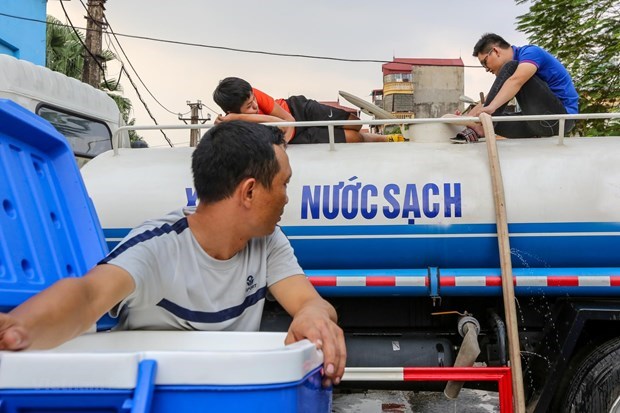 Environment
Environment

More drastic and comprehensive measures are needed to improve the efficiency of water resources and ensure water security, especially clean water supply to serve production and daily-life needs of people, the Ministry of Natural Resources and Environment has said.

|
| In the face of shortages, many people have to queue to get water from a public water truck. — VNA/VNS Photo |
HÀ NỘI — More drastic and comprehensive measures are needed to improve the efficiency of water resources and ensure water security, especially clean water supplies, the Ministry of Natural Resources and Environment (MoNRE) has said.
In Tân Minh Commune, Sóc Sơn District, which is only 30 kilometres from Hà Nội's centre, many people are still using groundwater for their daily activities due to a shortage of tap water.
To ensure hygiene, all households have a five-layer tank to filter the water before use, but the quality is not guaranteed.
Nearly 100 households in the commune have to wash the tank every 15-20 days and change the filters every two months. Filtered water still has a fishy smell.
Local water wells had been polluted due to domestic livestock, wastewater systems from factories in the area and impurities from metals.
Apart from being polluted, groundwater is gradually decreasing due to overexploitation, causing land subsidence.
In 2021, nearly 21,000 households in southernmost Cà Mau Province suffered from domestic water shortages due to the impact of natural disasters. Drought caused landslides and subsidence at 1,300 points across a length of more than 42 km of roads.
The reason was that local people drilled wells to get water. The exploitation of groundwater led to land subsidence and depletion of underground water sources in the area.
Currently, Cà Mau Province has 244 water supply works, supplying tap water for 41,400 households, around 18 per cent of total households. About 176,500 households, accounting for 76 per cent, are using water from wells.
Even in big cities, the volume of groundwater exploited remains high. The total amount of groundwater used in both business and residential areas is about 600,000 cubic metres per day. In Hà Nội, groundwater is estimated to account for about 70 per cent of the city's needs with about 1.3 million cubic metres per day.
Tiền Giang Province faces the worse situation when it comes to drought and salt intrusion. Đỗ Thị Muội, a resident in Tân Phú Commune, Tân Phú Đông District, said there was a severe shortage of groundwater in dry seasons in her commune.
The State has to support clean water for people here. She herself took about 30 litres of water for her family’s daily activities, she said.
Urgent measures
Nguyễn Long Hoai, director of the Sub-Department of Irrigation under Cà Mau Province’s Department of Agriculture and Rural Development, said the exploitation of groundwater had caused land subsidence and depletion of underground water sources.
In order to protect underground water sources and reduce pollution, the province has a plan to build large-scale, synchronous and inter-communal centralised clean water supply works.
To proactively respond to drought and salt in this dry season, Nguyễn Đức Thịnh, Deputy Director of the Irrigation Sub-Department, said that the committee had a plan to cope with drought and salinity since early this year.
The province had deployed a dam to prevent saline intrusion from the Tiền River to ensure water sources for the two provinces of Tiền Giang and Long An and to ensure water supply for 800,000 people in the city.
The province had also operated backup wells to supply water to Đồng Tâm and Bình Đức water plants to supply water sources to the eastern districts.
Lê Anh Tuấn, Scientific Research Advisor of the Institute of Climate Change Research of Cần Thơ University said key economic regions needed to set a goal to reduce the exploitation of groundwater in areas at risk of saline intrusion by one per cent annually.
Coastal areas should have a plan for safe water extraction areas by volume, in order to limit the displacement of the saltwater boundary and reduce the rate of saltwater intrusion.
Tuấn stressed that solutions to strengthen groundwater well management could only reduce the rate of subsidence, but would not completely prevent the situation. In addition to methods of storing fresh water and converting agricultural production, it was possible to apply artificial groundwater recharge techniques by pumping and compressing freshwater sources from rainwater or flood water.
Deputy Director of the Ministry of Natural Resources and Environment’s Water Resources Management Department Nguyễn Minh Khuyến said the ministry had submitted a national water security project by 2045 to the Government.
The project focuses on solutions, including strengthening and improving institutions, policies and financial mechanisms; attracting social resources to invest in the development of the water sector; improving the efficiency of management of water resources to ensure proactively supplying water for domestic and production purposes; improving degraded, depleted and polluted rivers, and sustainably developing aquatic resources and important wetland ecosystems, and ensuring water security for the environment.
The ministry had been speeding up the progress of planning water resources to submit to the Government for approval.
In the immediate future, it was necessary to improve the quality of planning. In the long run, the ministry would perfect a mechanism to increase investment, and attract resources to restore degraded and exhausted rivers, he said. — VNS